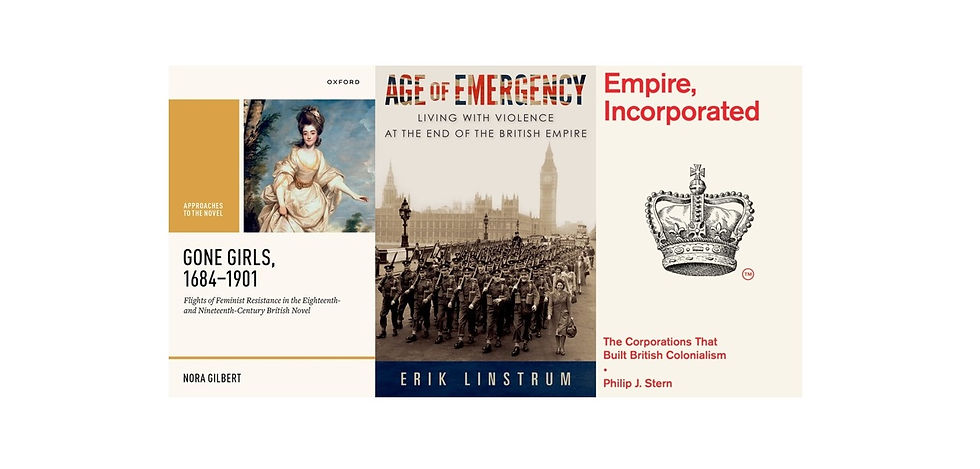Sep 24, 2024
2024 Stansky Book Prize Shortlist
Dear All,
The committee has selected the following three books for the 2024 Stansky Book Prize shortlist for the best book in British Studies dealing with the period since 1800.
Erik Linstrum, Age of Emergency: Living with Violence at the End of the British Empire (Oxford University Press)
Philip Stern, Empire, Incorporated: The Corporations that Built British Colonialism (Harvard University Press)
Nora Gilbert, Gone Girls,1684-1901: Flights of Feminist Resistance in the Eighteenth- and Nineteenth-Century British Novel (Oxford University Press)
Brief descriptions of the books and links to the publishers’ websites appear below. The winner of the Stansky Prize will be announced at the NACBS national conference in November.

Erik Linstrum, Age of Emergency: Living with Violence at the End of the British Empire (Oxford University Press)
Age of Emergency: Living with Violence at the End of the British Empire is a beautifully crafted and enormously important contribution to the cultural history of British decolonization. Historian Erik Linstrum makes a seemingly simple inquiry – whether British publics knew about the brutality being perpetuated in Kenya, Malaya, and Cyprus during the 1950s – but then follows that question into each corner of politics, press, performance, and personal behavior where knowledge about empire resided. The result is a manifold and sweeping argument that British publics were not only conscious of the colonial violence being carried out in their name but grew comfortable with and even embraced it. As Linstrum concludes, this history from more than half a century ago thus reveals the manners by which strategies of evasion and acknowledgments of violence are each woven through British society today.
Philip Stern, Empire, Incorporated: The Corporations that Built British Colonialism (Harvard University Press)
Philip Stern’s Empire, Incorporated places joint-stock corporations at the center of a deeply researched and sweeping reinterpretation of the British Empire since the sixteenth century. Charters promising exclusive rights to territories from Ulster to India, Hudson’s Bay to New Zealand, established dynamic forms of corporate or venture colonialism. This bold intellectual and institutional biography of colonial corporations—legal fictions that exercised real power—resists imposing a singular model and insists on their continuous lineage and coherent legacy. Stern’s incorporated empire, built through the mergers and acquisitions of companies, provided “limited moral liability” for colonial violence and will prompt reflection on continuing debates over the role of private enterprise in public governance.
Nora Gilbert, Gone Girls,1684-1901: Flights of Feminist Resistance in the Eighteenth- and Nineteenth-Century British Novel (Oxford University Press)
In Gone Girls, 1684-1901, Nora Gilbert provides a stirring account of the women and girls who ran from their presumed sites of safety and comfort—home. By examining how flight was a form of fight, Gilbert aptly demonstrates how women escaped to change their fortunes by force. She guides readers through “Gone Girl” stories from the Augustan, Romantic, and Victorian eras by engaging with both well-known authors like Charles Dickens, the Brontës, Elizabeth Gaskell, Mary Wollstonecraft and George Eliot, as well as less-remembered literary figures. Whether authors condemned or (more often) praised these fictional women for their defiance, characters shaped real women’s actions, including the rise of first wave feminism. At the same time, Gilbert does not lose sight of the profound imperial, class, ethnic, and other disparities that influenced these gendered rebellions. Through sharp writing and incisive analysis, Gilbert reminds us that sometimes the best thing a woman can do to regain her agency is to walk—or run—from those who try to limit or control her.
Congratulations to these authors for their outstanding scholarship.
Best wishes,
Stansky Book Prize Committee
NACBS Executive
